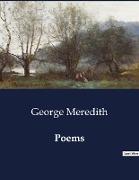"Poems" by George Meredith is a profound collection that showcases the poet's keen observation, lyrical skill, and philosophical depth. Through his verses, Meredith explores the complexities of human experience, from the depths of emotion to the heights of intellectual inquiry. Each poem is a testament to Meredith's mastery of language and his ability to capture the essence of life's fleeting moments. With themes ranging from love and nature to society and morality, Meredith's poetry offers readers a rich tapestry of thought-provoking reflections and lyrical beauty. "Poems" stands as a timeless testament to Meredith's enduring legacy as one of the Victorian era's most revered poets, whose words continue to resonate with readers across generations.


